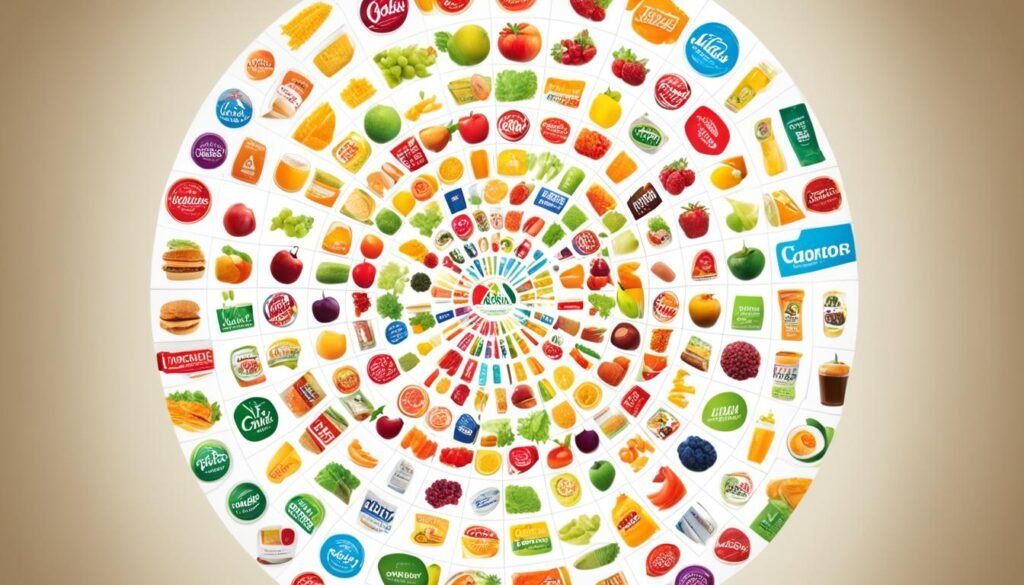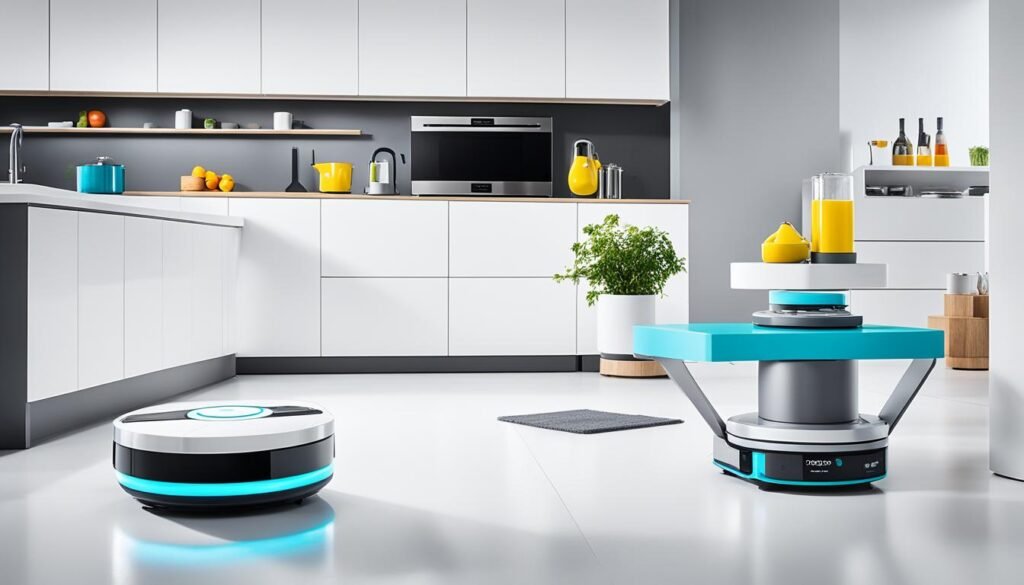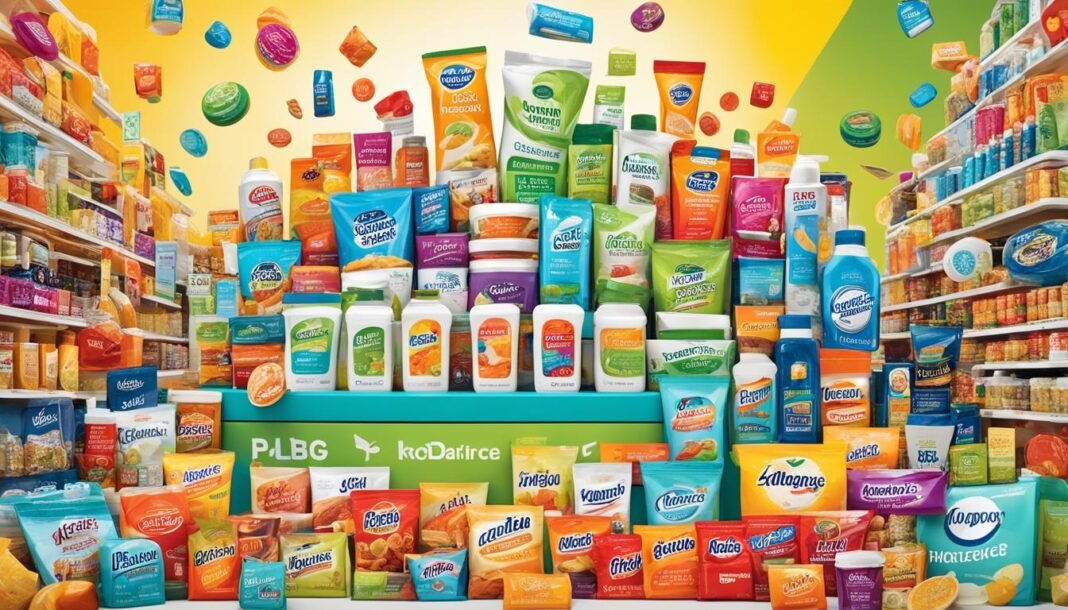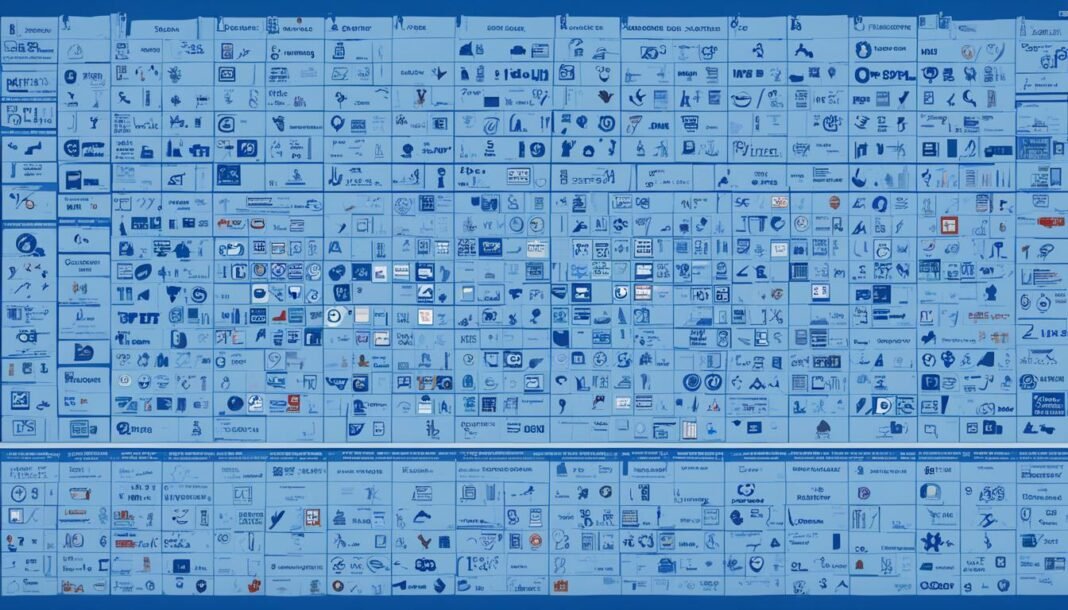Consumer non-durables cover many industries. These include household products, personal care, food, beverages, and tobacco. Let’s explore the top companies in this sector.
We’ll highlight their diverse offerings and industry dominance. From well-known FMCG brands to innovative manufacturers, we’ll examine key players shaping consumer goods.
Key Takeaways
- The consumer non-durables industry includes household items, personal care goods, food, beverages, and tobacco.
- Top companies stand out for brand recognition, product innovation, and market leadership.
- Major players include FMCG brands, food and beverage giants, personal care leaders, and tobacco companies.
- These firms dominate through acquisitions, diverse products, and strong marketing and distribution.
- Understanding key players is crucial. They shape products and services integral to daily life.
Exploring the World of Consumer Non-Durables
Consumer non-durables are diverse products that play a vital role in our daily lives. These items include household essentials and personal care products. They form the backbone of the consumer goods sector.
What Are Consumer Non-Durables?
Consumer non-durables are products with short lifespans that we replace often. They include food, beverages, cleaning supplies, cosmetics, and over-the-counter medications. These items have high turnover rates and need constant replenishment.
Unlike durable goods, non-durables don’t last for extended periods. They’re designed for quick consumption and frequent replacement.
The Importance of Consumer Non-Durables
These products are essential to our daily lives, meeting our basic needs. They provide sustenance, personal care, and help maintain our households. Consumer non-durables offer convenience, making our daily routines more efficient.
The consumer non-durables field significantly contributes to the global economy. Leading companies in this sector shape consumer trends and drive innovation.
Companies in this field range from household names to niche brands. They develop, manufacture, and distribute products we rely on daily. These organizations constantly adapt to changing consumer preferences and market demands.
“Consumer non-durables are the unsung heroes of our daily lives, providing the essentials that keep us going day in and day out.”
Household Names in the Consumer Goods Industry
The consumer non-durables field boasts many iconic brands. These consumer goods companies, FMCG brands, and household products manufacturers have built strong recognition. Their market dominance and innovative products have created loyal customer bases.
Here are some of the most recognizable names in this industry:
- Procter & Gamble – A global leader in personal care and household products. They own brands like Tide, Crest, and Gillette.
- Unilever – A multinational company with a diverse brand portfolio. Their brands include Dove, Axe, and Lipton.
- Johnson & Johnson – A well-known name in healthcare and consumer products. They offer everything from baby care to first-aid supplies.
- Colgate-Palmolive – A major player in oral care and personal care markets. Their brands include Colgate, Palmolive, and Hill’s Pet Nutrition.
These industry leaders have built their brands through consistent quality and innovative marketing. They deeply understand consumer needs. Their strong recognition and market share give them a competitive advantage.
“A brand is a living entity, and it is enriched or undermined cumulatively over time, the product of a thousand small gestures.” – Michael Eisner, former CEO of The Walt Disney Company
The success of these household products manufacturers shows the power of branding. It highlights the importance of meeting consumer demands in the consumer goods companies and FMCG brands industry.
Food and Beverage Giants
Several major food and beverage companies lead the consumer non-durables field. These giants offer a wide range of products, from packaged foods to beverages. Coca-Cola, PepsiCo, Nestle, and Unilever have secured significant market shares.
These companies use extensive distribution networks and innovative strategies. They aim to meet the changing tastes of consumers.
Personal Care Powerhouses
The personal care industry boasts numerous powerful brands. They cater to consumer needs in grooming, hygiene, and beauty. Procter & Gamble, Johnson & Johnson, and L’Oreal have built extensive product portfolios.
These personal care brands offer everything from toothpaste to cosmetics. They’ve created strong brand loyalty through quality products and effective marketing.

The consumer non-durables sector is dynamic and highly competitive. Food and beverage companies and personal care brands constantly adapt to consumer needs.
These industry leaders stay current with market trends. They invest in research and development to maintain their top positions.
Thriving Tobacco Companies
The tobacco industry remains a key player in consumer non-durables. Several tobacco companies have adapted to changing preferences and regulations. They’ve maintained their market presence despite evolving societal attitudes.
Philip Morris International has successfully tackled industry challenges. They’ve diversified their portfolio with innovative products like heat-not-burn tobacco and e-cigarettes. British American Tobacco has also adopted a multi-brand strategy.
These tobacco companies have focused on international expansion. They’re tapping into growing markets in Asia, Africa, and Latin America. This helps offset declining sales in mature markets.
Their ability to adapt to regulations and consumer trends is crucial. It’s key to their continued success in the consumer non-durables landscape.
| Top Tobacco Companies | Market Share | Primary Brands |
|---|---|---|
| Philip Morris International | 28.1% | Marlboro, Parliament, L&M |
| British American Tobacco | 24.9% | Dunhill, Lucky Strike, Pall Mall |
| Japan Tobacco International | 11.3% | Camel, Winston, Mevius |
| Altria Group | 10.4% | Marlboro, Black & Mild, Copenhagen |
Leading tobacco companies have shown resilience in the face of industry challenges. They continue to adapt and thrive in the ever-changing consumer non-durables market.
Paper Product Pioneers
The paper products sector is a key part of the consumer non-durables industry. It includes companies that make various paper-based household items. These items range from toilet paper to paper towels.
Paper product pioneers have become leaders in their categories. They meet the everyday needs of consumers with their innovative products.
Leading Brands in Paper Goods
Several names stand out as industry titans in the paper products world. Kimberly-Clark is a multinational corporation behind iconic brands like Kleenex, Huggies, and Scott.
Georgia-Pacific is another industry powerhouse. Its diverse portfolio includes Brawny paper towels and Quilted Northern bath tissue.
Procter & Gamble, the consumer goods giant, has made its mark too. It’s known for its Charmin and Bounty paper product lines.
| Brand | Parent Company | Key Products |
|---|---|---|
| Kleenex | Kimberly-Clark | Facial tissues, toilet paper, paper towels |
| Brawny | Georgia-Pacific | Paper towels |
| Charmin | Procter & Gamble | Toilet paper |
These paper product companies have established their dominance in the market. They’ve also innovated to meet changing consumer needs.
From eco-friendly options to specialized products, these pioneers have become household names. They continue to shape the world of consumer non-durables.
Innovative Household Products Manufacturers
The consumer non-durables field boasts innovative household products manufacturers. These companies create a variety of items, from cleaning supplies to home appliances. They constantly develop new solutions to meet changing consumer needs.
Procter & Gamble is a leading household products manufacturer. Known for brands like Tide and Crest, P&G invests heavily in research and development. They create cutting-edge products that simplify daily household tasks.
SC Johnson, maker of Windex and Glade, is another innovative household products manufacturer. They focus on eco-friendly and sustainable cleaning solutions. This caters to the growing demand for environmentally conscious products.
| Top Innovative Household Products Manufacturers | Notable Brands |
|---|---|
| Procter & Gamble | Tide, Crest, Bounty |
| SC Johnson | Windex, Glade, Raid |
| Unilever | Dove, Axe, Seventh Generation |
| Clorox | Clorox, Pine-Sol, Burt’s Bees |
These household products manufacturers prioritize innovation and sustainability. They respond to consumers’ desire for environmentally responsible products. By adapting to market trends, they maintain leadership in the consumer non-durables sector.

“Innovation is the lifeblood of the consumer non-durables industry. These companies must constantly reinvent and refine their products to stay ahead of the curve.”
The Role of Consumer Non-Durables in Daily Life
Consumer non-durables are essential to our everyday lives. They meet our basic needs and offer great convenience. Top companies like Procter & Gamble, Unilever, and Coca-Cola improve our quality of life through their products.
Meeting Everyday Needs
Non-durable goods are part of our daily routines. They include food, drinks, and personal care items. Colgate’s toothpaste keeps our smiles bright, while Kimberly-Clark’s Kleenex tissues offer comfort when needed.
These products do more than fulfill our needs. They add to our comfort and well-being. Consumer non-durables help us maintain a high standard of living.
| Company | Product Categories | Iconic Brands |
|---|---|---|
| Procter & Gamble | Household and personal care products | Tide, Crest, Gillette, Pampers |
| Unilever | Food, beverages, and personal care products | Dove, Lipton, Ben & Jerry’s, Vaseline |
| Coca-Cola | Beverages | Coca-Cola, Sprite, Fanta |
Companies in this field constantly innovate to meet changing customer needs. They focus on quality, convenience, and customer satisfaction. This commitment has made them trusted household names worldwide.
Sustainability and Consumer Non-Durables
The consumer non-durables industry faces pressure to prioritize sustainability. Leading consumer goods companies are taking steps to reduce their environmental impact. They’re introducing eco-friendly products and implementing sustainable manufacturing practices.
Top companies have made bold commitments to reduce their carbon footprint. They’re increasing the use of renewable materials and improving waste management. Unilever pledged to achieve net-zero emissions by 2039.
Procter & Gamble aims to use 35% recycled plastic in packaging by 2025. Smaller FMCG brands like Method and Seventh Generation focus on eco-friendly products. They meet growing consumer demand for sustainable options.
“Sustainability is no longer a nice-to-have, it’s a must-have for consumer non-durables companies. Consumers expect brands to take responsibility for their environmental impact and act accordingly.”
Sustainability drives innovation in the consumer non-durables sector. Companies strive to develop efficient production processes and create eco-friendly products. The industry explores new ways to reduce its environmental footprint.
The consumer non-durables industry is undergoing a significant transformation. Companies embrace eco-friendly practices and innovative solutions. They’re creating a more sustainable future while meeting changing customer demands.
Conclusion
The consumer non-durables field is dynamic and diverse. It includes leading consumer goods companies, FMCG brands, and innovative household products manufacturers. These industry giants shape consumer trends and drive growth in their sectors.
The market is evolving due to changing consumer preferences and sustainability concerns. Top tobacco companies and paper product companies will shape the industry’s future. Their ability to adapt and innovate will be crucial for maintaining leadership.
The consumer non-durables field remains vital and thriving. It caters to our everyday needs and enhances our quality of life. The success of these companies will shape the consumer goods industry’s future.
These companies will solidify their position as key players in the global market. Their continued success is essential for the industry’s growth and development.


